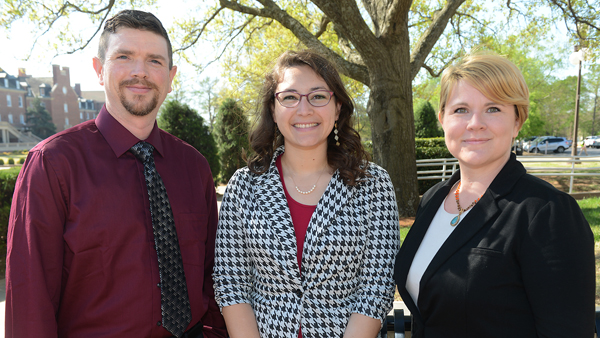Three current and future Oklahoma State University graduate students, and a student pursuing a graduate education at another university, have been awarded grants from the National Science Foundation as part of a program that financially supports graduate student scientists and engineers who have “potential for significant research achievement,” according to the NSF.
The OSU students were among 2,000 recipients out of 17,000 applications nationwide to receive 2016 NSF Graduate Research Fellowships.
Three students pursuing graduate educations at OSU were awarded fellowships May 3:
•Jimmy Lovett is a first-year Ph.D. candidate from Ochelata, Oklahoma. He is researching the effects of heavy metal contamination on bats. In his project, advised by Professor Karen McBee, Lovett is investigating the effects of contamination on the circadian rhythms and visual capabilities of bees.
•Michelle Lutiker is an OSU senior who begins graduate school this fall. Lutiker, from Houston, enters the geology Ph.D. program where she will work with Assistant Professor Natascha Reidinger. She is investigating uranium depletion in organic-rich shale formations to learn if the uranium content reveals depositional and post-burial processes at work in former marine environments.
•Ana Chicas-Mosier is completing her first year as a Ph.D. student in integrative biology. Chicas-Mosier, from Stillwater, is studying the behavior of honey bees in the Comparative Psychology and Behavioral Biology lab of Professor Charles Abramson. Her research involves understanding the behavior of honey bees impacted by aluminum contamination of food resources.
An additional OSU student is receiving a fellowship:
•Joseph Crook, from Tulsa, is an OSU senior set to graduate this spring. He will pursue a Ph.D. in horticulture from Purdue University.
“It’s really a great honor to receive this award,” said Chicas-Mosier. “I plan to go into teaching in academia and having this fellowship under my belt as a grad student is a big step toward becoming a professor.”
Award recipients will receive a $34,000 annual stipend while the graduate institution receives a $12,000 cost-of-education allowance. The NSF funds fellowships for three years, which can be used within a five-year period. For OSU recipients, the grants are a major boost to their graduate educations and research.
“The fellowship will give me more time to focus on my research instead of writing grant proposals seeking funding,” said Lovett “So the reduced stress of having to find financial support for your research is drastically alleviated.”
Lutiker, the mother of two children, said the financial support of the fellowship will ease the difficulties of attending graduate college and caring for her family.
“It’s going to allow me to focus on school and balance school and family,” Lutiker said.
